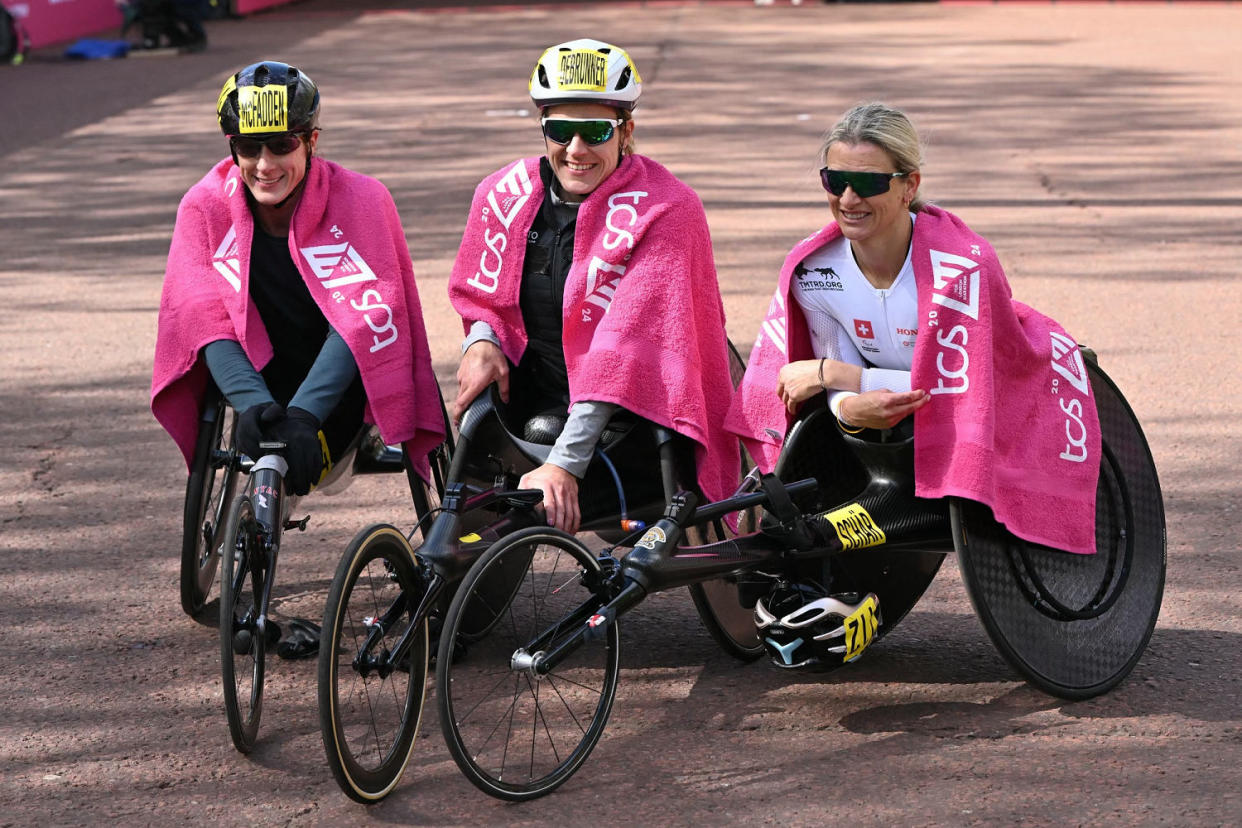In a first, London Marathon awards wheelchair and non-disabled athletes equal prize money
LONDON — In a global first for equality in sports, wheelchair athletes and non-disabled runners participating in the London Marathon on Sunday were competing for the exact same prize money.
The move makes the event the only marathon in the world to award winners the same sum — $55,000 for first place, $30,000 for the runners-up and $22,500 for third-place finishers. Organizers said they were unaware of any other major athletic event in any sport that has taken a similar step.
By equalizing the prize pot, marathon organizers have said they hope to pave the way for other races and sporting events to offer parity, encouraging more athletes to participate in disability sport and removing financial barriers to participation. The parity extends to gender: Both male and female wheelchair athletes are eligible for equal prize amounts.
The men's wheelchair division race was won by Marcel Hug, a Paralympian widely considered the world’s best wheelchair racer, who cheered the decision ahead of the race.
“The London Marathon is setting a great and strong but also courageous example for equality and inclusion that should go beyond the world of sport and hopefully inspires in other areas, too,” Hug told NBC News.
Hug crossed the line in one hour, 28 minutes and 35 seconds in London to claim his fifth victory.
American athlete Daniel Romanchuk placed second behind Hug. In third was British wheelchair racing star David Weir, a six-time Paralympic gold medalist who’s won the London race eight times before — more than any other athlete.
Swiss athlete Catherine Debrunne won the women's event with a time of one hour, 3 minutes and 54 seconds.
Manuela Schar, also from Switzerland came in second and American Tatyana McFadden placed third.

In Boston, the top prize for the wheelchair division was $40,000. In the open division, the non-disabled male and female winners took home $150,000 — more than three times as much.
The 26.2-mile race in London kicked off Sunday morning south of the Thames River, crossing over Tower Bridge and passing iconic London landmarks like the Tower of London, the London Eye and the Big Ben before reaching the finish line near Buckingham Palace.
Hugh Brasher, the London Marathon’s event director, cast the move as part of an evolution toward greater inclusion for athletes with disabilities that started in 1983 when the London race held its first wheelchair event, and continued with multiple International Paralympic Committee World Championships held since then in the British capital.
Romanchuk, 25, who grew up in Maryland, applauded the decision to equalize the prize structure, predicting it would have “huge effects beyond race day.”
“London Marathon’s equal prize money helps elevate perception of the sport to reflect the reality that we’re professional athletes, training and competing just like other professional athletes,” Romanchuk told NBC News as he traveled to London for the race. “My main hope is that it brings more visibility to the sport so that more athletes with disabilities can see the possibility of having an active lifestyle and participate in community running races.”
Another reason why equalizing the financial aspect of sports is important, Romanchuk said, is that the high cost of specialized equipment for wheelchair racing often prevents lower-income athletes from getting involved. He said adaptive sports equipment starts at several thousands of dollars at entry level — far more than the pair of running shoes that a nondisabled athlete would need to start competing.
Romanchuk said he’d first gotten involved in adaptive sports when he was 2 years old, describing the effect it had on his development and self-confidence.
“They taught me to focus on what I did have — two strong arms — instead of what I didn’t have,” said Romanchuk, who was born with spina bifida, a congenital defect that affects the spinal cord. “The fact that my legs didn’t work normally was never an acceptable reason why I couldn’t reach a particular goal.”
